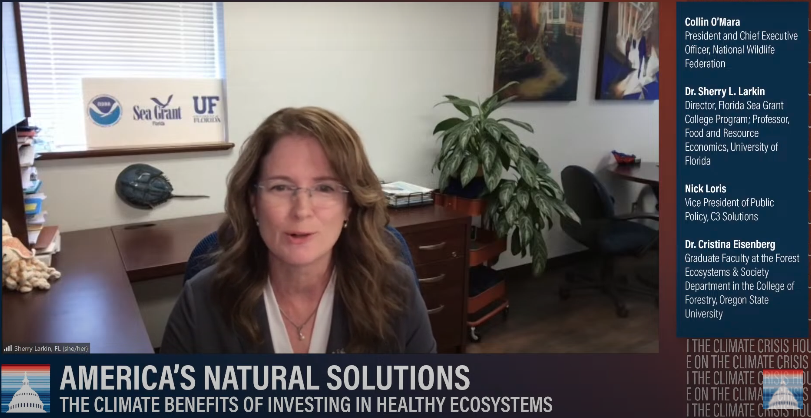On April 1, Florida Sea Grant Director Dr. Sherry Larkin testified before the U.S. House Select Committee on the Climate Crisis on the potential of new, nature-based solutions that support the health of our coastal and marine ecosystems. These solutions, Larkin stated, have been proven to improve our coastal habitats, strengthen our communities’ ability to withstand sea level rise, and increase America’s $373 billion-dollar Blue Economy.
“Science helps us understand how much our environment reduces the economic impact of climate change,” said Larkin, who is also a natural resource and environmental economist and at the University of Florida. “It is now time for us to partner fully with that environment to improve the resilience of our coastal areas.”

The hearing, “America’s Natural Solutions: The Climate Benefits of Investing in Healthy Ecosystems,” reviewed the climate benefits of the investments made in ecosystem restoration and conservation through the Great American Outdoors Act and the Bipartisan Infrastructure Law. It also examined opportunities for further investment to create healthy and resilient habitats and communities, which lends itself almost directly to the mission of the National Sea Grant Program, within which Dr. Larkin conducts Florida’s state-wide program. Sea Grant is uniquely positioned for this charge working within the National Oceanic and Atmospheric Administration (NOAA) under the Department of Commerce and jointly across federal, state and county partners.
U.S. Rep. Kathy Castor, D-FL, opened the hearing with discussion on nature’s role in providing critical, low-cost tools to tackle worsening climate impacts that jeopardize American lives and livelihoods. “These climate impacts increasingly will harm important sectors of our economy, including agriculture, forestry, fisheries, energy, and tourism,” said Castor. “Unless we take urgent action, these industries will be permanently impacted by the climate-fueled loss of species and habitats, which is already taking place.”
In Florida, Larkin emphasized, the share of the economy that is driven by its coastline is well above the nation’s percentage of 40%; it is over 75% making climate resilience intertwined with the state’s future.
The main focus of Dr. Larkin’s oral testimony rested on investment into coastal habitats, in the areas of habitat restoration including research and training on the development and construction of living shorelines, water quality, and development of climate alliances that focus on the needs of underserved and historically unrepresented communities.
Investment into these areas of coastal habitat health, according to Dr. Larkin, requires more than just habitat restoration. Essential to their direct application to climate change and its impacts are (1) site specific research that evaluates net carbon effects, alternative solutions, and proposed policy, (2) public education that encourages homeowners, policy makers and relevant industry sectors to operate and lead with climate-forward practices, and (3) training and workforce development programs that grow a new Blue Economy to include and benefit all Americans.
Of note, Dr. Larkin highlighted ongoing climate work in Florida worthy of further investment such as restoring of coastal seagrass, mangrove, sponge, coral, and sea oat habitats which sequester greenhouse gasses responsible for global warming, rising seas and ocean acidification. Additionally, Dr. Larkin raised the promising restoration aquaculture research and programming underway with an emphasis on the permanent carbon uptake ability of shellfish through the calcification process. This mention of the permanent conversion of CO2 into insoluble mineral in shellfish offered the potential for a more efficient alternative to the committee’s focus on forestry resources and tree planting as the ideal carbon sink, owing to the fact that, unlike shellfish, photosynthetic plants store carbon on a temporary basis. In addition, several plants in the sea – like mangroves – store more carbon than their land-based counterparts, further emphasizing the potential for natural living shorelines to protect our coastlines and clean our air and water.
Other witnesses called before the committee included Collin O’Mara, President and Chief Executive Officer of the National Wildlife Federation (NWF), Nick Loris, Vice Present of Public Policy at C3 Solutions and an expert on a wide range of energy and climate policies, and Dr. Cristina Eisenberg, Graduate Faculty at the Forest Ecosystems & Society Department in the College of Forestry at Oregon State University.
Highlights and video of the event are available at the committee’s website.
Read Dr. Sherry Larkin’s full, written testimony on new solutions to address the impacts of climate change.